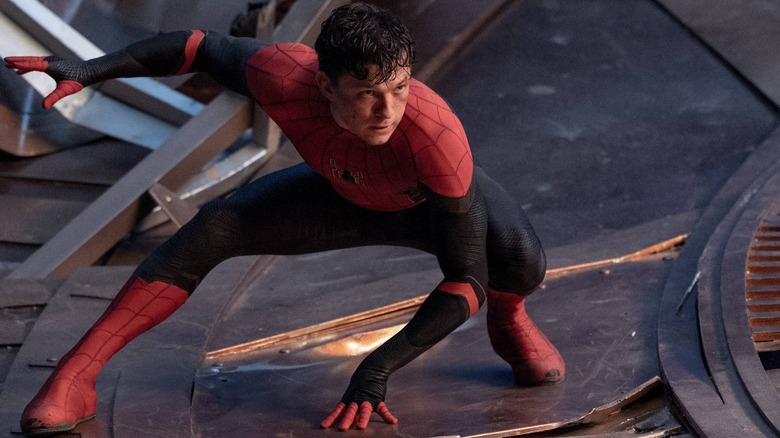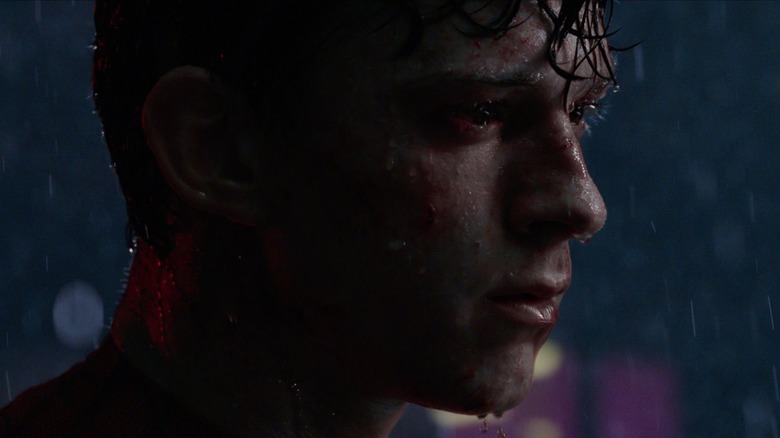Why It Took Three Spider-Man Movies For *That* Line To Be Said In The MCU
This post contains spoilers for "Spider-Man: No Way Home."
Some things simply can't be avoided in certain superhero movies. Bruce Wayne's parents will always die horrific deaths (usually in slow-motion), Superman will always fool everybody about his secret identity by slipping on a pair of glasses, and Spider-Man will always burden himself over how the power of his gifts require an innate sense of responsibility, too. That exact line of dialogue may not always be stated in every single Spidey movie, but the shadow cast by those words — commonly attributed to Uncle Ben, but originally stated by the omniscient narrator at the very end of the "Amazing Fantasy #15" comic in 1962 — looms large over every incarnation of Peter Parker.
However, subtext just isn't enough sometimes. With every appearance in the Marvel Cinematic Universe since his arrival in 2016's "Captain America: Civil War," a growing segment of viewers have grown increasingly aware of the glaring omission of the literal words, "With great power comes great responsibility" throughout Tom Holland's run as Spider-Man. In fact, the entire presence of Uncle Ben himself has thus far been relegated to blink-and-miss-it Easter eggs or minor references that the majority of audiences likely missed.
This all changed in "Spider-Man: No Way Home" ... but with one big twist. As it turns out, screenwriters Chris McKenna and Erik Sommers found a clever way to pay homage to the web-head's established legacy while still putting their own unique spin on it. In an interview with THR, the writing duo explained their thought process that led up to the long-overdue uttering of those classic words. According to Sommers, they didn't necessarily feel much pressure to force it in either "Spider-Man: Homecoming" or its sequel, "Far From Home." But when the opportunity presented itself with the shocking death of Aunt May (Marisa Tomei), they jumped at the chance to shake things up:
"As the story started to develop, and as we got to the scene with May, we realized, 'This is going to be Peter's Uncle Ben,' and the words are going to come out. For the scene on the rooftop, where the three Peters meet, we felt pretty strongly that we need something to really, finally crystalize it for these three guys that they are the same, that they are brothers. And that they are bound in a cosmic way by something and having them share those words in common seemed like the thing to do."
The Elephant in the Room
Later in the interview, McKenna addresses the previous choice to push Spider-Man straight into the action in "Civil War" and, in "No Way Home," invert the usual Uncle Ben/Peter Parker dynamic ... even if that came at the cost of fridging a female character to further the male lead's emotional journey:
[Screenwriters Christopher] Markus and [Stephen] McFeely and the Russos were so smart with 'Civil War' to side step rehashing the origin story. You just leap over it, but it leaves so many questions and gaps. Some people [ask], 'Oh, did Uncle Ben die? Was he guilty [of Ben's death]? Are we losing that gravitas as part of that character?' I think that's something we've always discussed. 'What is the deal with his Uncle Ben? Is it a total parity — is it one-to-one?'
We started thinking, 'Well maybe it's not. Maybe his mentor is May and she's instilled this thing in him. He doesn't say, 'With great power comes great responsibility,' but he says something to that effect in 'Civil War,' which is, 'When you can do the things that I can do and you don't do anything, then you are responsible.' It's that same sentiment that I think has been instilled in him from May, but you start realizing that May really is the moral guide of his life and he's had a father-figure."
By now, the cat is well out of the bag that "Spider-Man: No Way Home" does, indeed, feature all three live-action actors who've played the hero joining forces in one big, multiversal crossover. Given how important that creed is for both Tobey Maguire's and Andrew Garfield's versions, clearly it was finally time to draw a direct comparison between each one of their origin stories. What better way to do that than by acknowledging both their similarities and differences? As McKenna puts it:
"Hopefully you start seeing this is a different Peter Parker. They are all different. They have had different origins ... In this one, there is a whole new way [Holland's Peter] has to get tested about what these other two guys have been tested by. By the death of a loved one at the hands of a villain. What are you going to do about that? They help him get there."
"Spider-Man: No Way Home" is currently playing in theaters.

